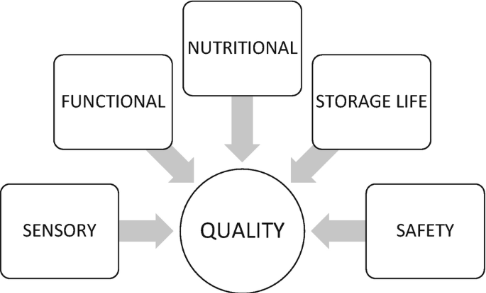Peptidomics-Based Food Quality Evaluation Service
- Raw Food Materials (e.g., fruits, vegetables, grains, seeds, legumes, meat, fish, poultry)
- Processed Foods (e.g., dairy products, protein isolates, fermented foods)
- Food Extracts (e.g., protein concentrates, hydrolysates)
- Food Byproducts (e.g., whey, soy residue, fish skin)
- Solid Samples: 5–10 g of raw or processed food material.
- Liquid Samples: 10–20 mL for biofluids or liquid extracts.
- Hydrolysates: 1–2 mL of concentrated hydrolysate.
- Samples should be stored at -80℃ and shipped with dry ice.
Food quality evaluation has traditionally relied on chemical, physical, and microbiological indicators to assess freshness, safety, nutritional value, and organoleptic properties. However, these conventional methods often fail to capture the subtle biochemical changes that occur during food processing, storage, or spoilage. Recent advances in omics technologies have introduced peptidomics as a powerful tool to complement and enhance food quality analysis. Peptidomics refers to the comprehensive study of peptides, short amino acid sequences generated through enzymatic or chemical cleavage of proteins. These peptides serve as sensitive markers of biological activity, degradation processes, microbial contamination, and enzymatic modifications. By profiling the peptidome of food samples, researchers can gain deeper insights into quality, safety, processing history, and authenticity.

Service at MtoZ Biolabs
MtoZ Biolabs offers a dedicated Peptidomics-Based Food Quality Evaluation Service that combines high-resolution mass spectrometry, expert bioinformatics analysis, and optional functional screening. Our Peptidomics-Based Food Quality Evaluation Service platform enables accurate identification and quantification of peptides, revealing molecular-level changes that reflect food freshness, degradation, adulteration, and bioactivity. This service supports food producers, quality control labs, regulatory agencies, and researchers in ensuring product integrity and consumer safety.
The key components of our offering include:
💠Comprehensive Peptidome Profiling
We perform global profiling of peptides present in food samples at different processing or storage stages, enabling detailed molecular characterization of food quality status.
💠Spoilage and Degradation Monitoring
By identifying peptides formed during protein degradation, we assess spoilage levels and evaluate product shelf life and stability.
💠Processing History and Fermentation Assessment
We characterize proteolytic fingerprints linked to specific processing steps, fermentation phases, or microbial enzymatic activity to ensure batch consistency and product traceability.
💠Detection of Adulteration or Quality Loss
Unexpected peptide profiles may indicate the addition of undeclared ingredients, substandard raw materials, or improper handling, helping detect food fraud or authenticity issues.
💠Bioactivity Evaluation
Optionally, we assess the presence of bioactive peptides that contribute to the functional value of the product, supporting claims related to health benefits or nutritional enhancement.
💠Nutritional Value Assessment
We analyze peptide composition to evaluate the nutritional quality of food products, offering insights into protein digestibility, amino acid balance, and functional peptide content.
💠Allergen Detection
By identifying peptide fragments associated with known food allergens, we support allergen surveillance and labeling compliance, helping reduce consumer risk and ensure regulatory safety.
Analysis Workflow
1. Sample Preparation: Food samples are processed to extract peptides suitable for downstream analysis.
2. Peptide Enrichment: Peptides are purified to remove interfering substances and concentrate relevant molecules.
3. Mass Spectrometry Analysis: High-resolution LC-MS/MS is used to identify and quantify peptides across samples.
4. Data Processing and Interpretation: Identified peptides are analyzed for quality indicators and functional relevance using specialized bioinformatics tools.
5. Report Generation: Results are compiled into a comprehensive report with visualizations and expert insights to support quality assessment and decision-making.

Service Advantages
✔️Advanced Analysis Platform
MtoZ Biolabs established an advanced Peptidomics-Based Food Quality Evaluation Service platform, guaranteeing reliable, fast, and highly accurate analysis service.
✔️Tailored Solutions for Different Food Types
Whether for fresh, processed, fermented, or bioactive foods, our service is customizable to fit the unique needs of your product, ensuring relevant and actionable results.
✔️Expert Bioinformatics Support
Our advanced bioinformatics tools interpret complex data to provide clear, actionable insights into the biological relevance of peptides, ensuring data is ready for decision-making or regulatory submission.
✔️Comprehensive One-Stop Service
From sample preparation to final reporting, MtoZ Biolabs offers a complete, integrated service, streamlining the process and saving you time and resources.
✔️One-Time-Charge
Our pricing is transparent, no hidden fees or additional costs.
Sample Submission Suggestions
1. Sample Types
We accept various sample types, including but not limited to:
2. Sample Quantity
3. Storage and Transport
*Note: If you have special sample types or require additional guidance, please contact us for personalized support before shipping.
Deliverables
1. Comprehensive Experimental Details
2. Materials, Instruments, and Methods
3. Total Ion Chromatogram & Quality Control Assessment
4. Data Analysis, Preprocessing, and Estimation
5. Bioinformatics Analysis
6. Raw Data Files
Related Services
Food-Derived Functional Bioactive Peptides Discovery Service
How to order?







